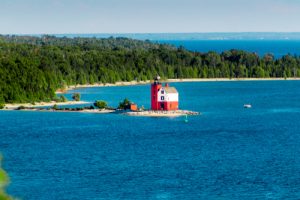
U.S. Reps. Dave Joyce (R-OH) and Bill Huizenga (R-MI) joined their fellow co-chairs of the bipartisan House Great Lakes Task Force and 30 other members to urge that this year’s Water Resources Development Act (WRDA) include support for the Great Lakes.
“The Great Lakes are an indispensable resource,” Rep. Huizenga said. “Congress must continue to prioritize the Great Lakes from both an economic as well as an ecological perspective.”
As the U.S. House Transportation and Infrastructure Committee moves to conference the WRDA with the U.S. Senate, the lawmakers specifically asked that the final package include the previously approved 80 percent federal cost share and full authorization for the Brandon Road project to prevent invasive Asian Carp from entering the Great Lakes, according to an Oct. 8 letter the congressmen sent to committee leaders.
Rep. Joyce, Rep. Huizenga, and their colleagues also requested inclusion of a full five-year reauthorization and funding increase for the Great Lakes Restoration Initiative (GLRI), as proposed by the GLRI Act of 2019, H.R. 4031, as well as expanded authorization for the Great Lakes Resiliency Study.
“The Great Lakes are an invaluable natural resource and economic powerhouse, supporting over 1.5 million jobs and providing clean drinking water to millions more,” Rep. Joyce said. “We need to make the necessary investments to treat them like the national treasure they are.”
In the lawmakers’ letter, they noted that the U.S. House of Representatives is in a strong negotiating position as both the WRDA and the GLRI were approved with overwhelming bipartisan support on the House floor.
“The Senate Environment and Public Works Committee has also considered the issue, as part of S. 3591, the America’s Water Infrastructure Act, which it reported out in May,” wrote the members. “However, that legislation only included a 1-year reauthorization and funding increase.”
The successes and partnerships responsible for restoring and protecting the Great Lakes relies on the GLRI’s multi-year authorization for “projects critical to the remediation of toxic hotspots and the restoration of the Great Lakes ecosystem,” according to their letter.
Likewise, they requested that the Brandon Road Lock and Dam construction be authorized at an 80 percent federal cost share, citing the project as being of “national significance” because it impacts the health and ecosystem of the entire Great Lakes basin.
And the Coastal Resiliency Study is a necessity as resilience has become a growing concern due to the continued deterioration of conditions in the Great Lakes region, the lawmakers wrote. “Rising temperatures, longer growing seasons, increased precipitation, and more extreme weather events are all contributing factors to the declining conditions throughout the Great Lakes region,” wrote the members. “Investing in the resilience of the Great Lakes is a worthwhile effort, as the National Institute of Building Science found that every $1 spent on resilience can save $6 on disaster and mitigation costs.”
Task force co-chairs U.S. Reps. Marcy Kaptur (D-OH) and Debbie Dingell (D-MI) were among the 32 other lawmakers who signed the letter.



